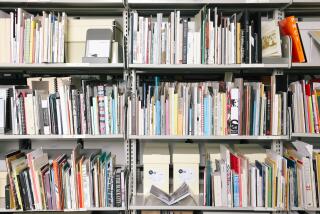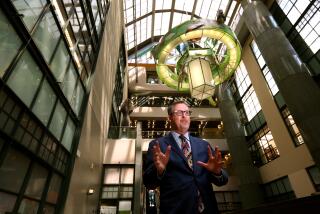UCLA Buys Sontag’s Archive
- Share via
The UCLA Library has purchased the literary archive of Susan Sontag, one of the best-known and most influential American intellectuals of the late 20th century.
Sources close to the sale say the library paid $1.1 million for her personal papers, letters and manuscripts and library. Funds were donated by an anonymous UCLA alumna.
Sontag, 69, was raised in Tucson and Los Angeles but has lived in New York more than four decades. She said her first choice for placement of her archive would have been the New York Public Library, but added that “It is a source of great pleasure to me that it is going to a place I had a connection with. Southern California has been part of my life.”
The archive, which will come to UCLA next month, arrives at a time of increasing competition among American university libraries for literary collections. Throughout the 1970s, prices for papers of well-established authors were relatively low, ranging from $25,000 to $75,000. By 1997, the archive of Ted Hughes, Britain’s poet laureate, had been acquired by Emory University in Atlanta for about $600,000, and in 1994 Stanford University paid a reported $980,000 for poet Allen Ginsberg’s extensive manuscripts, one of the largest amounts garnered by an archive of a then-living author.
Sontag is best known for her provocative essays on subjects ranging from her own experience with cancer to an analysis of the art of photography, as well as for her novels. She won the National Book Award for fiction in 2000 for “In America” and received the Jerusalem Prize in 2001 for her body of work, an honor given at the Jerusalem International Book Fair and considered second only to the Nobel Prize in literary prestige.
“Against Interpretation,” her first collection of essays, published in 1966, is considered a modern classic for its discussions of the arts and contemporary culture.
Sontag has been a human rights activist for 30 years, and served from 1987 to 1989 as president of the American Center of PEN, the international writers organization dedicated to freedom of expression and the advancement of literature.
A brief essay in the New Yorker magazine immediately after the Sept. 11 terrorist attacks created the biggest controversy of her career. In it, she savaged political leaders and media pundits for characterizing America’s enemies as cowards. She has since said she was stunned by the vitriolic response, which included editorials calling her a traitor and American-basher.
“Susan Sontag is a phenomenally versatile writer, a wide-ranging thinker and committed activist,” said Victoria Steele, head of the UCLA department of special collections. “Her papers will appeal to scholars interested in everything from art history to literature, women’s studies and the history of medicine.”
David Zeidberg, director of the Huntington Library in San Marino, said, “If her papers have commandeered a seven-figure price, it’s because they were worth it.”
Sontag’s correspondence includes 2,500 letters to and from such notable literary figures as essayist Jacques Derrida, poet Czeslaw Milosz, novelists Larry McMurtry and Philip Roth, as well as documents from her campaign as PEN president on behalf of Salman Rushdie, who was targeted in 1989 with a death threat by the Ayatollah Khomeini of Iran.
She has stipulated that some of the letters may not be read until 25 years after her death, according to Steele. The archive also includes drafts of Sontag’s four novels, “The Benefactor,” “Death Kit,” “The Volcano Lover” and “In America”; her collection of short stories; and seven works of nonfiction, notably “On Photography” and “Illness as Metaphor.”
There are also film scripts, production notes, still photographs and other materials that document the creation of the four foreign art films Sontag wrote and directed that were released between 1969 and 1983. Diaries and notebooks are among the 89 handwritten workbooks in the collection, dating from 1948. Her personal library of 20,000 volumes of literature, history, art and the social sciences, valued at $440,000, is part of the sale to UCLA as well. The materials include copies of her work in the 28 languages into which it’s been translated.
Sontag said financial considerations and a lack of storage space motivated the sale. “I have only my apartment in New York, and I’ve saved a lot of stuff, so I have a Manhattanite’s space problem,” she said. “If I had a huge attic or cellar, I’m sure there would be less incentive to disburden. Money isn’t the main consideration, but I go through long periods when I don’t make any money. This is something that will support me for a couple of years.”
In 1990, she received a MacArthur Foundation grant of $340,000, paid out over five years, which she says relieved financial pressure during that period.
In her more than 40-year career, Sontag has been politically outspoken, offending both the left and right. In the 1980s, she described communism as “fascism with a human face” and in the 1990s was outspokenly critical of the U.S.-led bombing campaign against Serbia.
She was diagnosed with breast cancer in her early 40s, and while undergoing treatment wrote “Illness as Metaphor,” examining the ways society projects its fear of disease by attaching dark meanings to it. Five years ago uterine cancer was discovered, but her health is currently said to be good, and she has been active on the lecture circuit.
Andreas Brown, owner of the Gotham Book Mart and a leading archival consultant, said acquiring the papers of living authors has become more common in the 30 years since a change in tax laws removed the incentive for estates to donate archives.
“Norman Mailer is asking $2.5 million for his archive. That’s absurd,” Brown said. “There are only two 20th century authors who would be in that ballpark, J.D. Salinger and Thomas Pynchon, because of the mystique they have.”
The University of Texas has long been the foremost collector in the field, but the Huntington Library is actively collecting 20th century writers. Emory University has concentrated on Irish literature.
Brown called the Sontag acquisition “quite a coup for UCLA.”
Pulitzer Prize-winning novelist McMurtry said: “Most authors sell their archives as an additional source of income. I sell my papers every year. I’d never give a university a page. Almost any school can find an angel at the level of $25,000 to $75,000 for two to five years’ worth--three drafts of a novel, all the drafts you produce writing a screenplay.
“It becomes a harder sell when the price goes up to seven figures,” he said. “Susan Sontag has worked for a long time, at a high level, in a great number of disciplines, which made her archive significant.”
Sontag says she has given right of first review to UCLA for future papers and does not want the sale to be seen as a sign of her retirement.
“I have the most profoundly American temperamental conviction that the future still holds new things for me,” she said. “Selling the archive is not, ‘Now it’s all over, and I’m packing up and getting ready to think about my estate.’ I don’t feel this is one of the gestures that one performs toward the end of one’s life.”
More to Read
Sign up for our Book Club newsletter
Get the latest news, events and more from the Los Angeles Times Book Club, and help us get L.A. reading and talking.
You may occasionally receive promotional content from the Los Angeles Times.






